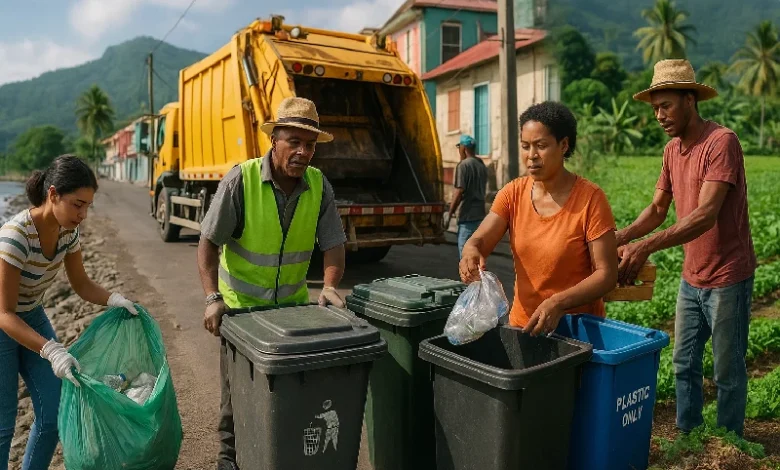Waste management in Dominica

Waste management in Dominica is a key component of the country’s environmental protection strategy, aimed at safeguarding public health, preserving natural resources, and supporting the island’s tourism industry and agricultural sector. The Dominica Solid Waste Management Corporation (DSWMC), established in 1996 under the Waste Management Act, is the primary institution responsible for the collection, treatment, and disposal of solid waste. Its role extends beyond simple garbage collection, focusing on sustainable waste handling, public awareness, and compliance with environmental laws.
Historical Background of Waste Management in Dominica
Waste management in Dominica evolved from informal community-based disposal methods in the early 20th century to structured municipal collection systems by the 1980s. Before organized services, households relied on open burning, burying, or dumping in rivers and ravines. These practices, though common, led to environmental degradation and public health concerns. The creation of the Dominica Solid Waste Management Corporation (DSWMC) in 1996 marked a major turning point, establishing a national framework for waste collection, landfill operations, and public education. This period saw the introduction of centralized waste disposal at Fond Cole Sanitary Landfill, replacing scattered dumpsites.
By the early 2000s, the government and DSWMC expanded collection coverage to rural communities, upgraded its truck fleet, and developed initiatives for derelict vehicle removal, storm debris clearance, and the distribution of waste bins to underserved areas. Regional cooperation through the Organisation of Eastern Caribbean States (OECS) and funding from agencies like the Caribbean Development Bank further improved infrastructure and operational capacity.
Today, historical lessons from decades of waste handling continue to shape Dominica’s push for sustainable, environmentally conscious waste management systems.
Recycling and Community Engagement
Dominica has been gradually integrating recycling into its waste management system, focusing primarily on plastics, glass, and metals. Pilot projects, such as the Zero-Waste Initiative in partnership with the Organisation of Eastern Caribbean States (OECS), have introduced waste separation at source, home composting, and the collection of recyclables for export. Composting programs are especially important for Dominica’s agriculture, as they reduce organic waste volumes and create nutrient-rich soil additives.
Public education campaigns, including “Be the Solution, Stop Pollution”, are central to shifting community attitudes. Schools, village councils, and community groups are regularly involved in cleanup drives, competitions, and workshops that teach the importance of waste reduction, reuse, and recycling. These programs not only address waste issues but also foster a culture of environmental stewardship across generations.
Challenges to Effective Waste Management
Dominica’s waste management system faces persistent challenges. Illegal dumping along roadside areas and the west coast remains a significant issue, especially in rural districts where collection routes are limited. The lifespan of the Fond Cole Landfill is another concern, as space constraints and increasing waste volumes threaten long-term sustainability. There are also operational pressures linked to vehicle maintenance, staff shortages, and the costs of processing and transporting recyclables.
The island’s mountainous terrain and scattered settlements make waste collection logistically demanding. Heavy rainfall events, sometimes linked to tropical storms and hurricanes, can disrupt waste collection schedules and increase the volume of debris requiring disposal.
Policy Reforms and Future Developments
To address these issues, the Government of Dominica is exploring a range of policy and infrastructure improvements. Proposals include the development of a waste-to-energy facility to convert non-recyclable waste into electricity, thereby reducing landfill use. Expansion of recycling infrastructure is also being considered, along with more rigorous enforcement of litter laws through higher fines and community service penalties.
Dominica has benefited from technical assistance and funding from regional and international partners, including the Caribbean Development Bank (CDB) and the Japan International Cooperation Agency (JICA). These partnerships have supported fleet upgrades, landfill management improvements, and training programs for waste management personnel.
A growing area of focus is integrating waste management into disaster preparedness, ensuring that post-disaster cleanups are rapid, efficient, and environmentally safe. The DSWMC has also been assessing ways to involve private sector partners in recycling and composting ventures, to help build a circular economy model on the island.
Outlook for Waste Management in Dominica
Dominica’s waste management strategy is evolving toward a more sustainable, community-driven approach. While challenges remain, ongoing education, infrastructure investment, and legislative enforcement are gradually building a cleaner, healthier environment. By strengthening partnerships, promoting recycling, and incorporating modern technologies, Dominica aims to set a regional example in balancing economic development with environmental protection.




